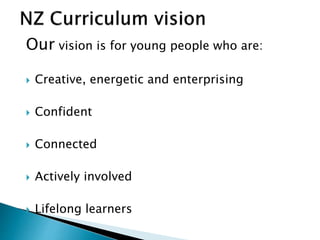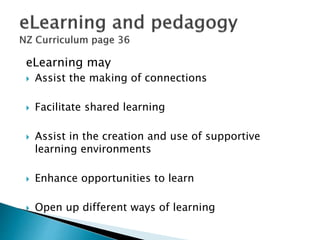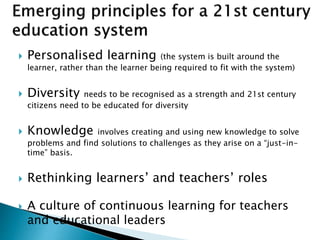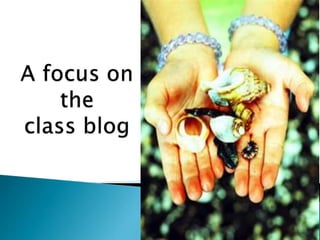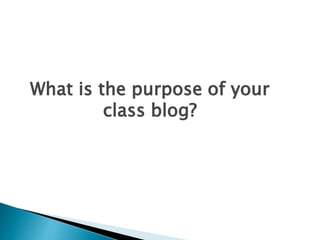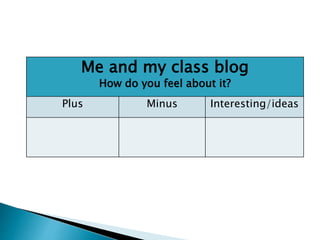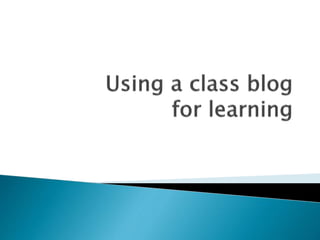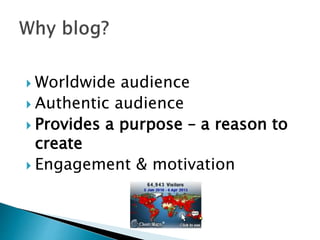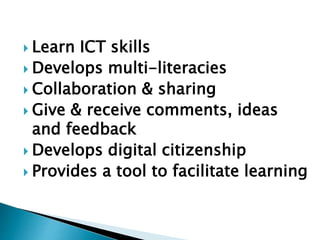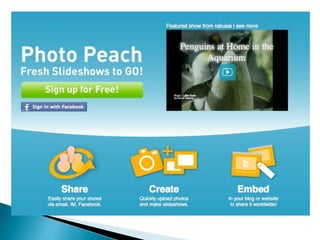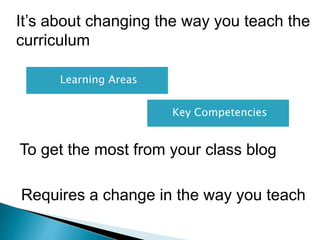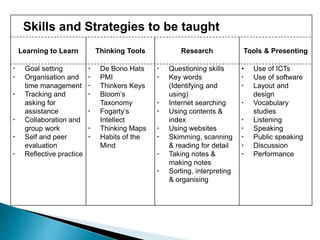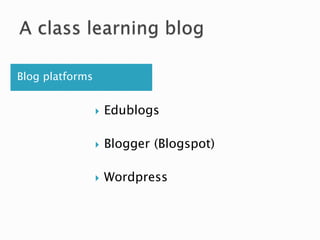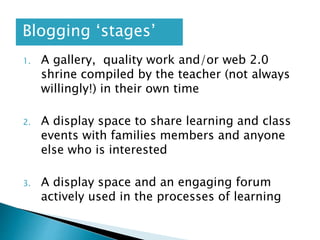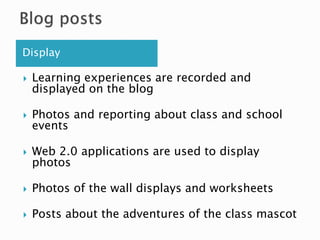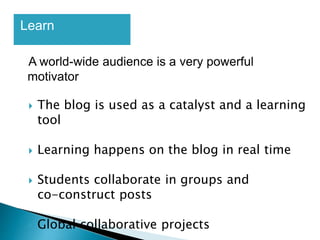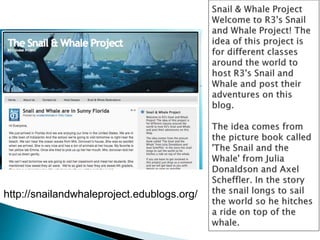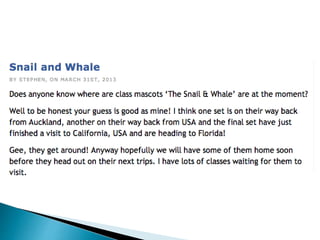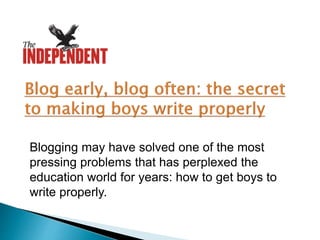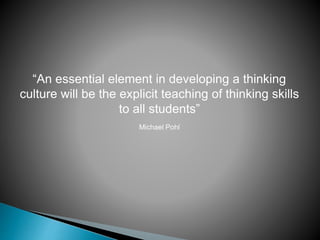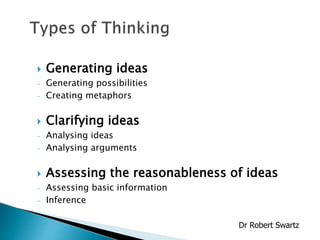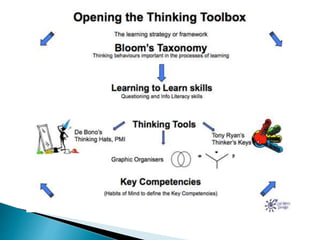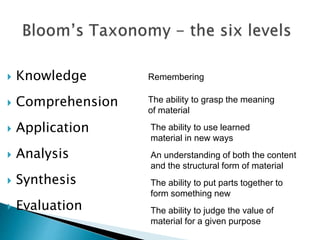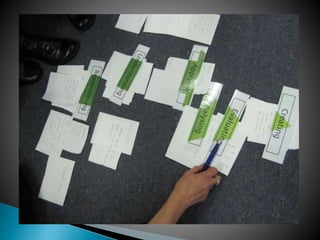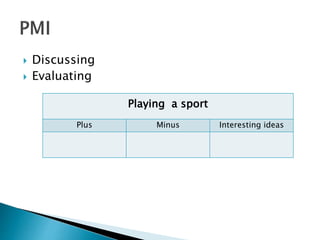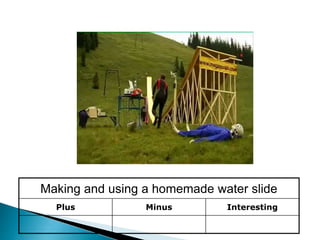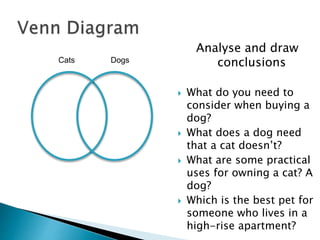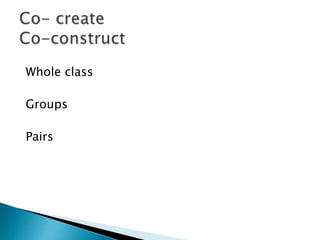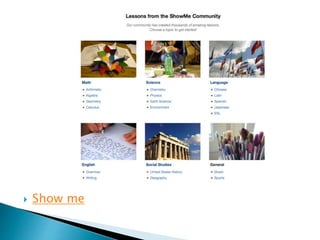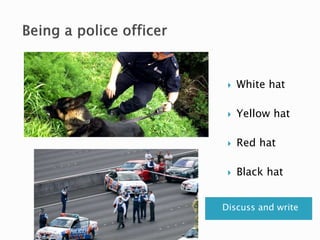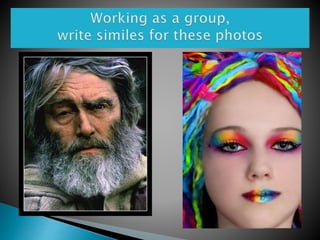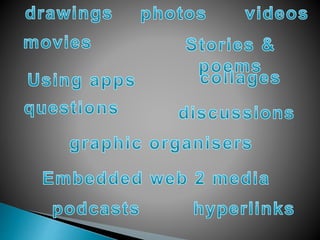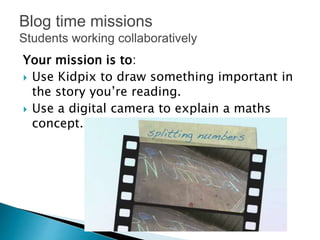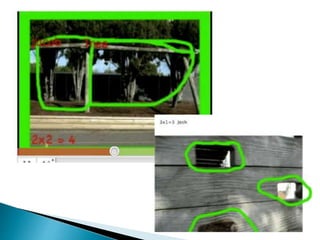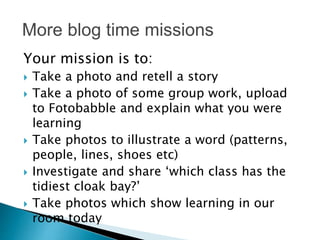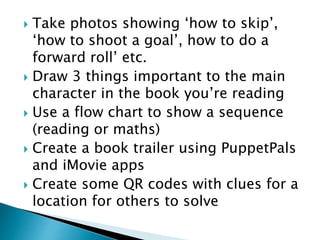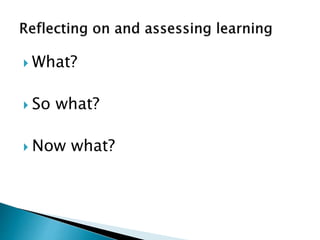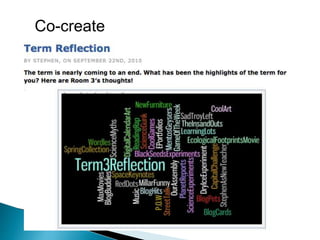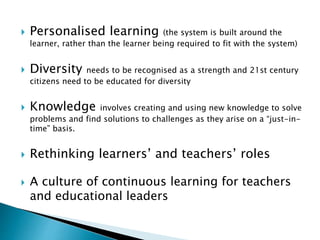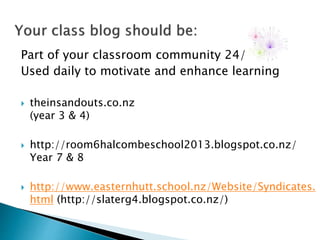Your Class Blog
- 1. Our vision is for young people who are: ï― Creative, energetic and enterprising ï― Confident ï― Connected ï― Actively involved ï― Lifelong learners
- 2. eLearning may ï― Assist the making of connections ï― Facilitate shared learning ï― Assist in the creation and use of supportive learning environments ï― Enhance opportunities to learn ï― Open up different ways of learning
- 3. ï― Personalised learning (the system is built around the learner, rather than the learner being required to fit with the system) ï― Diversity needs to be recognised as a strength and 21st century citizens need to be educated for diversity ï― Knowledge involves creating and using new knowledge to solve problems and find solutions to challenges as they arise on a âjust-in- timeâ basis. ï― Rethinking learnersâ and teachersâ roles ï― A culture of continuous learning for teachers and educational leaders
- 5. What is the purpose of your class blog?
- 6. Me and my class blog How do you feel about it? Plus Minus Interesting/ideas
- 8. ï― Worldwide audience ï― Authentic audience ï― Provides a purpose â a reason to create ï― Engagement & motivation
- 9. ï― Learn ICT skills ï― Develops multi-literacies ï― Collaboration & sharing ï― Give & receive comments, ideas and feedback ï― Develops digital citizenship ï― Provides a tool to facilitate learning
- 12. Learning Areas Key Competencies Requires a change in the way you teach Itâs about changing the way you teach the curriculum To get the most from your class blog
- 13. Skills and Strategies to be taught Learning to Learn Thinking Tools Research Tools & Presenting ï Goal setting ï Organisation and time management ï Tracking and asking for assistance ï Collaboration and group work ï Self and peer evaluation ï Reflective practice ï De Bono Hats ï PMI ï Thinkers Keys ï Bloomâs Taxonomy ï Fogartyâs Intellect ï Thinking Maps ï Habits of the Mind ï Questioning skills ï Key words (Identifying and using) ï Internet searching ï Using contents & index ï Using websites ï Skimming, scanning & reading for detail ï Taking notes & making notes ï Sorting, interpreting & organising âĒ Use of ICTs ï Use of software ï Layout and design ï Vocabulary studies ï Listening ï Speaking ï Public speaking ï Discussion ï Performance
- 14. Blog platforms ï― Edublogs ï― Blogger (Blogspot) ï― Wordpress
- 15. 1. A gallery, quality work and/or web 2.0 shrine compiled by the teacher (not always willingly!) in their own time 2. A display space to share learning and class events with families members and anyone else who is interested 3. A display space and an engaging forum actively used in the processes of learning Blogging âstagesâ
- 16. Display ï― Learning experiences are recorded and displayed on the blog ï― Photos and reporting about class and school events ï― Web 2.0 applications are used to display photos ï― Photos of the wall displays and worksheets ï― Posts about the adventures of the class mascot
- 17. Learn A world-wide audience is a very powerful motivator ï― The blog is used as a catalyst and a learning tool ï― Learning happens on the blog in real time ï― Students collaborate in groups and co-construct posts ï― Global collaborative projects
- 21. Blogging may have solved one of the most pressing problems that has perplexed the education world for years: how to get boys to write properly.
- 22. âAn essential element in developing a thinking culture will be the explicit teaching of thinking skills to all studentsâ Michael Pohl
- 23. ï― Generating ideas - Generating possibilities - Creating metaphors ï― Clarifying ideas - Analysing ideas - Analysing arguments ï― Assessing the reasonableness of ideas - Assessing basic information - Inference Dr Robert Swartz
- 25. ï― Knowledge ï― Comprehension ï― Application ï― Analysis ï― Synthesis ï― Evaluation Remembering The ability to grasp the meaning of material The ability to use learned material in new ways An understanding of both the content and the structural form of material The ability to put parts together to form something new The ability to judge the value of material for a given purpose
- 27. ï― Discussing ï― Evaluating Playing a sport Plus Minus Interesting ideas
- 28. Making and using a homemade water slide Plus Minus Interesting
- 29. Analyse and draw conclusions ï― What do you need to consider when buying a dog? ï― What does a dog need that a cat doesnât? ï― What are some practical uses for owning a cat? A dog? ï― Which is the best pet for someone who lives in a high-rise apartment? DogsCats
- 31. ï― Show me
- 32. Discuss and write ï― White hat ï― Yellow hat ï― Red hat ï― Black hat
- 37. Your mission is to: ï― Use Kidpix to draw something important in the story youâre reading. ï― Use a digital camera to explain a maths concept. Blog time missions Students working collaboratively
- 39. Your mission is to: ï― Take a photo and retell a story ï― Take a photo of some group work, upload to Fotobabble and explain what you were learning ï― Take photos to illustrate a word (patterns, people, lines, shoes etc) ï― Investigate and share âwhich class has the tidiest cloak bay?â ï― Take photos which show learning in our room today More blog time missions
- 40. ï― Take photos showing âhow to skipâ, âhow to shoot a goalâ, how to do a forward rollâ etc. ï― Draw 3 things important to the main character in the book youâre reading ï― Use a flow chart to show a sequence (reading or maths) ï― Create a book trailer using PuppetPals and iMovie apps ï― Create some QR codes with clues for a location for others to solve
- 41. ï― What? ï― So what? ï― Now what?
- 42. Co-create
- 43. ï― Personalised learning (the system is built around the learner, rather than the learner being required to fit with the system) ï― Diversity needs to be recognised as a strength and 21st century citizens need to be educated for diversity ï― Knowledge involves creating and using new knowledge to solve problems and find solutions to challenges as they arise on a âjust-in- timeâ basis. ï― Rethinking learnersâ and teachersâ roles ï― A culture of continuous learning for teachers and educational leaders
- 44. Part of your classroom community 24/7 Used daily to motivate and enhance learning ï― theinsandouts.co.nz (year 3 & 4) ï― http://room6halcombeschool2013.blogspot.co.nz/ Year 7 & 8 ï― http://www.easternhutt.school.nz/Website/Syndicates. html (http://slaterg4.blogspot.co.nz/)

